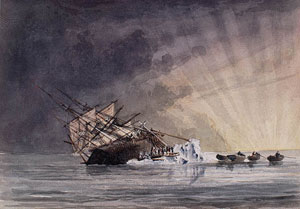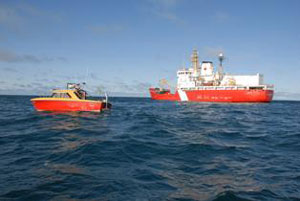Parks Canada 2010 Arctic Surveys
HMS Erebus and HMS Terror
In 1992, the Government of Canada declared the wrecks to be a national historic site of Canada. This designation came as a result of their association with Franklin's last expedition; namely its role in the history of exploration of Canada's north and the development of Canada as a nation.
A memorandum of understanding (MOU) was signed in August 1997, between Great Britain, as owners of the vessels, and Canada, as the nation in whose water they were lost. If and when found, the MOU assigns control over site investigation, excavation or recovery of either wrecks or their contents to Canada. Mandated to protect and present subjects of national significance, Parks Canada has been identified as the federal agency responsible for the search and subsequent preservation of the vessels.
The search for HMS Erebus and HMS Terror is extremely complex due to the vastness and harsh conditions of the Arctic, coupled with the varying interpretations of Franklin's history. Although a number of attempts to locate HMS Erebus and HMS Terror have been unsuccessful to date, a general search area has been identified based on one particular interpretation supported by Inuit knowledge.
 Sketch of the situation of the H.M.S. Terror at sunrise, July 14, 1837 Library and Archives Canada/Mary Montagu Album/C-006125
Sketch of the situation of the H.M.S. Terror at sunrise, July 14, 1837 Library and Archives Canada/Mary Montagu Album/C-006125Parks Canada's Underwater Archaeology Service (UAS) will lead a second archaeological exploration to search for HMS Erebus and HMS Terror, off the coast of Nunavut, with projected dates of August 6-August 31, 2010. The first expedition was conducted in August 2008. This Canadian-led expedition is a collaborative project among Parks Canada, the Canadian Hydrographic Service (CHS), the Canadian Coast Guard and the Government of Nunavut. The partnership combines a breadth of expertise and will inevitably provide new information and add to the body of research on the fate of these ships. The expedition will last for approximately three weeks. A third expedition is tentatively planned for the summer of 2011, if necessary.
In August 2008, the first expedition resulted in the charting of a 65-km-long approach corridor, leading from the main navigation channel to the target area, allowing safe access for the search team and setting the stage for the upcoming seasons. The CHSobjectives for the 2008 and 2010 projects included the bathymetric reconnaissance of the survey area, as well as the corridor surveys of the principal navigation routes of the North-West Passage. The CHS accomplished a significant amount of survey work in 2008, including the precise positioning of shore-line navigation aids, tide measurements and hydrographic mapping. Parks Canada UAS staff supported the CHS in this work.
 Canadian Coast Guard’s Sir Wilfrid Laurier, with Canadian Hydrographic Services survey vessel in foreground. 2008 HMS Erebus and HMS Terror survey
Canadian Coast Guard’s Sir Wilfrid Laurier, with Canadian Hydrographic Services survey vessel in foreground. 2008 HMS Erebus and HMS Terror survey© Parks Canada
The expedition team will search for the vessels using side-scan sonar, which collects acoustic images and is able to cover a large search area. If HMS Erebusand HMS Terror are found, all future archaeological investigations will again be led by Parks Canada. The expedition is staged from the Canadian Coast Guard ice-breaker, CCGS Sir Wilfrid Laurier.
HMS Erebus and HMS Terror have historic and cultural significance for local Inuit, who speak of at least one of the ships in their oral history, which was seen northwest of the Adelaide Peninsula prior to its sinking. The expedition team has worked closely with the Inuit people in conducting research and in planning this search. It is believed that Inuit oral history and research could hold the key to unlock the discovery of HMS Erebus and HMSTerror.
A discovery of either or both wrecks, or any of their contents, will offer unprecedented information on the search for the North-West Passage, the exploration of Canada's North and the fate of Sir John Franklin, HMS Erebus and HMS Terror and their crew – all critical pieces to the shared history of Canada and Great Britain.
http://www.pc.gc.ca/eng/culture/expeditions/erebus-terror.aspx
http://www.pc.gc.ca/eng/culture/expeditions/erebus-terror.aspx

No comments:
Post a Comment